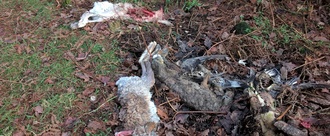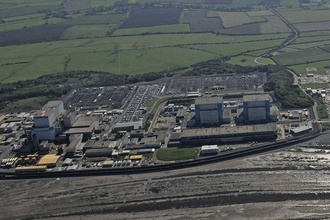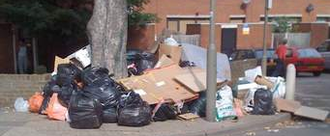-
Ban the use of stink pits in EnglandStink pits are fenced enclosures, bins or holes dug out by gamekeepers who then fill them with rotting carcasses of discarded game birds, as well as other wild and domestic animals in order to attract target species such as foxes in to a large quantity of snares. In this photo, taken on a Sheffield moor, it appears that ‘non-target’ species are being repeatedly captured - in this case mountain hares. The current approach to managing the Sheffield moors appears to be having a significant and detrimental effect on the local mountain hare population. This excessive use of snares by gamekeepers does not follow DEFRA's code of practice on the use of snares, or the industry's good practice guidance (e.g. BASC) of "quality over quantity". This is why we are calling for a ban on stink pits.4,479 of 5,000 SignaturesCreated by Sheffield and Rotherham Wildlife Trust

-
National Trust Board of Trustees to consider their positions.The board no longer represents the views of it's members, or the public on hunting. Trail hunting does not exist and was created to exploit loopholes in the Hunting Act. All of the hunts involved have vowed to continue hunting, and habitually go hunting without trails being laid with a pack of dogs trained to kill Foxes. They could easily convert to drag hunting if they wished to avoid killing animals, instead they go armed with terrier-men whose only purpose is to dig out animals that are hiding in fear of their lives. Despite banning terrier-men on National Trust land, the hunts still regularly go out to kill animals with no evidence of a trail being laid, and the National Trust do nothing to monitor the activity that they licence, instead answering their members concerns with disingenuous copy and paste answers, and all of this after they used their block vote to override the members wishes. Enough is enough, it is time for them to go!1,968 of 2,000 SignaturesCreated by Paul Taylor
-
Free Parking in Wollaton ParkBecause greater access to the park will improve and lengthen lives across the city. The regular parking charge in Wollaton Park is a tax on the people of the city impeding access to the health benefits of green space. An disincentive where there should be an incentive. Citing Michael Marmot, the team at Public Health England have written a report titled 'Local action on health inequalities: Improving access to green spaces'; quoting from the report directly, this is the Summary: 1. There is significant and growing evidence on the health benefits of access to good quality green spaces. The benefits include better self-rated health; lower body mass index, overweight and obesity levels; improved mental health and wellbeing; increased longevity. 2. There is unequal access to green space across England. People living in the most deprived areas are less likely to live near green spaces and will therefore have fewer opportunities to experience the health benefits of green space compared with people living in less deprived areas. 3. Increasing the use of good quality green space for all social groups is likely to improve health outcomes and reduce health inequalities. It can also bring other benefits such as greater community cohesion and reduced social isolation. 4. Local authorities play a vital role in protecting, maintaining and improving local green spaces and can create new areas of green space to improve access for all communities. Such efforts require joint work across different parts of the local authority and beyond, particularly public health, planning, transport, and parks and leisure. http://www.hullpublichealth.org/assets/PHE/Briefing8.pdf The council claim to raise £300,000 revenue from parking charges. They do not account for the capital or ongoing costs directly associated with collection of that revenue. The indirect cost to the cafes, attraction and shops within the park, from deterred customers is also not considered material by the council. Thinking long term, recognising that the council will continue to look after the people of the city for perpetuity and the rising cost of social care, would the books be better balanced with a healthier elderly population in 10, 20, 30, 100 years time? The charge should be removed.204 of 300 SignaturesCreated by Matthew Spowage
-
Make indiscriminate Killing of Wildlife by Companies IllegalThis is the United kingdoms legacy to its children We have a moral responsibility to retain Britain's wildlife, not wipe it out of existence. We have a responsibility to show our children compassion toward living beings We have a responsibility to show our children that the almighty £pound is not the be all and end all of our existence. - Morals before destruction - compassion before profit - responsibility, accountability and transparency605 of 800 SignaturesCreated by Ria Knott
-
Stop the dumping of Hinkley Point 'radioactive’ mudThe company building Hinkley C in North Somerset, EDF Energy, has obtained a marine licence to dump 200,000 cubic meters of dredged-up mud and sediment in the channel Cardiff Bay. Experts fear the mud may be more radioactive than is currently understood. Critical concerns are: 1) There are 50 different radionuclides and testing has only taken place on 3 of these. 2) Only surface samples have been taken between 0 and 5cm, research from other sites has shown that if samples are taken from five times deeper, there can be a five times higher collection of radioactivity. 3) The large tidal range in the Brisol Channel means that waste could be transferred from the sea into land, either through coastal flooding or even sea spray heading up to 10 miles inland.218 of 300 SignaturesCreated by Philip Chaddah-Duke
-
Urgent review of the new Bin Collection Schedule in Daventry DistrictThe new proposed scheme to start in June 2018 does not take into account the following issues - 1) Families, especially families with medical needs or pets, and what happens to any waste that cannot be fitted into the waste bin. Are you providing a larger bin for them? Or a variety of bins - e.g. one for nappies? 2) Where the excess household waste goes. Does each household over 2/3 people go weekly/fortnightly to the recycling centre to drop off their excess waste? This will produce more traffic, and more emissions to damage our fragile environment, and more queuing at the recycling centre at the weekend. 3) The increase in fly tipping by households that refuse to take their excess household waste to the appropriate place, or have too much recycling to deal with. 4) Reducing the regular collection of recycling will negatively affect families with children. Families with children are in the forefront of recycling with the younger generations supporting it widely. Family red and blue boxes are usually over flowing already, which should be appreciated. Collection every 2 weeks will cause strain on this, as 1 bin (equivalent to 5 boxes) will not be enough. What will happen to the excess recycling? Burnt in the garden? Transported to the recycling centre weekly? The space for recycling needs to be increased, not maintained a the current level. 5)Collecting garden waste at a cost to householders is not acceptable. Throughout the Spring-Autumn each household with a garden will collect garden waste. Not getting collected will lead to garden fires and unsightly gardens. Many avid gardeners are retired householders, pensioners with little money, who will find it very difficult to dispose of their garden waste without the council's help. Again, increasing the likelyhood of garden fires. None of that is good for our environment, for the ozone or the aesthetics of the district. Winter is less productive in the garden and a fee could be levied then if required. At any other time it is absolutely necessary, and any fee levied is clearly for profit. 6) Collecting food waste every week seems particularly premature as the number of households producing this waste for collection is currently low in comparison to other waste. Why increase this before the need is realized? It is much easier to put on the compost at home than a bin full of recycling or household waste. 7) Asking the local community throughout the district before making these major changes to the bin collection schedule.787 of 800 SignaturesCreated by Helen Dascalescu
-
Remove plastic from teabagsThe petition I started last year with 38 Degrees to remove all plastic from tea bags succeeded in persuading the UK's largest tea bag manufacturer, Unilever/PG Tips to remove plastics from their teabags. But the other leading UK teabag manufacturers are still using plastics in their teabags. The issue of having these plastics (polypropylene) in teabags is a concern. 20-25% plastic in each teabag is not a small or insignificant amount when multiplied up by the millions and millions of tea bags consumed daily. These plastics do not biodegrade in the environment. There have been many campaigns to keep plastics and microplastics out of our seas, highlighting the harm they do to marine life. But the same is true of plastics on land as they can cause harm to birds and small mammals. We need to keep ALL plastics OUT of our environment. We know that it is possible to use other materials that are biodegradable and I am told by a major European teabag paper manufacturer that there is a “Gold Standard” of cellulose-based bags that will readily compost in your garden compost bin, which, in fact, goes a stage better than the PLA-based bags about to be employed by PG Tips and Coop. With your support, we can make the other UK teabag manufacturers remove plastic from their tea bags.178,241 of 200,000 SignaturesCreated by Mike Armitage

-
Save Newcastle's ParksThe Parks Trust is an attempt to protect parks from severe local authority budget cuts and avoid responses taken elsewhere, some of which have gone as far as selling off parks for development. The new trust is being billed as a pioneering innovation with the potential to be rolled out to other local authorities in similarly dire financial situations. Without action, this model could pave the way for commercialisation of the nation's parks on a massive scale. Imagine billboards advertising chocolate bars and fizzy drinks, large areas carpeted over for car parking in areas which should be served by public transport, events held on so many days of the year that large areas are off limits to those without the means to pay. All these things are a very real possibility and they undermine the social benefits of parks that have been safeguarded for generations.167 of 200 SignaturesCreated by David Webb
-
Police chiefs must genuinely consult campaigners protesting against the onshore oil and gas industryThe police continually insist they value dialogue with campaigners who oppose plans to drill for oil and gas in local communities. It doesn’t feel that way, however, to people who are taking part in protests against these activities. Instead, they have condemned the way their human rights have been repeatedly trampled on by the police, how concerns raised with senior officers about aggressive policing are ignored and how formal complaints are hurriedly dismissed. Campaigners say officers have pushed them into hedges, violently dragged older people across roads, shoved others into speeding traffic and persistently made arbitrary and incomprehensible arrests. For eighteen months, the National Police Chiefs Council (NPCC) has kept promising to review the direction it gives local forces on the policing of these protests and at last, this now seems imminent. Despite pressure from Netpol, however, the senior officer leading the review has been extremely reluctant to consult directly with campaigners, despite their invaluable first-hand experiences of the way policing operations are conducted. We say: meaningful dialogue and genuine accountability means listening to critical voices. We want Lancashire Assistant Chief Constable Terry Woods - the NPCC Lead on Shale Gas and Oil Exploration - to take consultation seriously and formally invite members of the public to submit their testimony on the policing of local anti-fracking protests. The NPCC then needs to brief all the participants in the consultation on how its national guidance has subsequently been updated and improved.1,318 of 2,000 SignaturesCreated by Netpol Campaigns

-
Colgate, Let The EU Residents Recycle Their Toothbrushes!Currently, in America, you can have your toothbrushes, toothpaste tubes and other Colgate products recycled, and you even get payed for it! You send it to Terracycle and they turn it into other products for building materials. But not in the EU! We have to pay to have them recycled and it costs over £100 a box! Toothbrushes and toothpaste tubes wash onto our beaches in the millions every day, if colgate offered everyone the opportunity to recycle their products, their sales would go up!160 of 200 SignaturesCreated by Katie Miller
-
Build Bristol Arena at Temple Meads not at FiltonIt makes sense to build at Temple Quarter ( Arena Island) because: 1.It is located next door to Bristol Temple Meads train station, the major transport hub in the region, set to grow its numbers over the coming years and in line for major development from GWR and Network Rail. 2.Local train stations and lines go directly to Temple Meads and visitors from outside the city can already easily travel from their towns, mitigating pollution and congestion. 3.Bus routes from all over the city already go to the area and the new metro bus lines will also enable quicker access to the site. 4.It is in a central position allowing many locals to either walk, cycle, or take public transport to the venue. Historically South Bristol is underserved by access to facilities, work and opportunities mainly located in North Bristol. The Arena Island would enable fairer access. 5.Other successful arenas are built in the centre of cities, don't have lots of car parking and work perfectly well. 6. We believe Buckingham group are ready to start work for a fixed price of £110 million, within the budget set by BCC. 7. The arena would further accelerate the economic development of the Temple Quarter Enterprise Zone, much needed. 8. The arena would be owned by Bristol City Council and profits can be put back in to fund local services. 9. Money has already been spent there - in 2007 £13 million had already been spent to purchase and clear the site. The total cost of the arena, £91 million, will be funded by the council which will provide £38 million and the West of England Local Enterprise Partnership funding the remaining £53 million. 10. Identity - an arena building in the centre would become an iconic emblem adding to the city's reputation, feeding the city-scape and helping to bring more international recognition to our great city, a site next to South Glos would not have that same setting or impact. It doesn't make sense to build at Brabazon Hangar in Filton because: 1. An arena at the Brabazon Hangar is car-centric, and given the current lack of travel alternatives, would go against the attempts of the city, local institutions, citizens, businesses and communities to create a more environmentally friendly city and would increase air pollution which is already at illegal levels. 2. It would create further gridlock for roads around Filton and the M4/5 unless significant transport developments are put in place, which would take many years to achieve. 3. Roads across the city will be gridlocked with thousands of people attempting to cross the city from the south, centre, west and east. 3. The likely economic benefits will be passed on to South Glos and surrounding areas in north Bristol, already bestowed with higher than average economic opportunities. 4.The Brabazon is already privately owned by YTL, a Malaysian group. How much of the profits will go back to Bristol's economy? 5. The location doesn't encourage overnight stay, 'the night time economy' or tourism as much as in the centre would. It doesn't have the enormous range of accommodation, eateries and other attractions on it's doorstep that the temple quarter site already has.6,195 of 7,000 SignaturesCreated by David Wilcox
-
Make plastic drink straws obsolete in cinemasUK cinemas are responsible for hundreds of thousands of plastic straws being thrown away every week. They make a huge amount of profit on selling fizzy drinks and last year there were 170 million tickets sold to cinemas in the UK. If all those drinks were served with paper straws it'd make a massive difference to the plastic ending up in our seas.* 'The marine Conservation society estimates the UK uses up to 8.5 billion plastic straws every year which are among the top 10 items found in beach clean ups'. Plastic straws should be considered a serious problem to marine species survival: I've done recent beach clear-ups myself and can testify they are a common, harmful type of sea pollution. Plastic straws can travel long distances throughout the world's oceans, getting ingested by marine animals- taking up vital space in their stomachs that takes up increasing space for digesting food to eventually starve and kill them. Straws get tangled in seaweed beds in coastal waters where they will continue to accumulate like an off-shore rubbish dump if the supply isn't stopped for good. The EU is considering banning them this year, and asking Environment Minister, Michael Gove to align with EU member states in this- but Gove has been cautious and not clearly affirmed this- yet. A large lobby and petition to ban plastic straw sale and manufacture in the UK could decide the matter this year, to see a change in UK law to make them obsolete. * We recommend that cinemas keep a small number of plastic straws behind the counter for customers with medical conditions or disabilities who require one.218,731 of 300,000 SignaturesCreated by Julia Robinson
Hello! We use cookies to improve your experience by providing insights into how the site is being used. Find out more.












